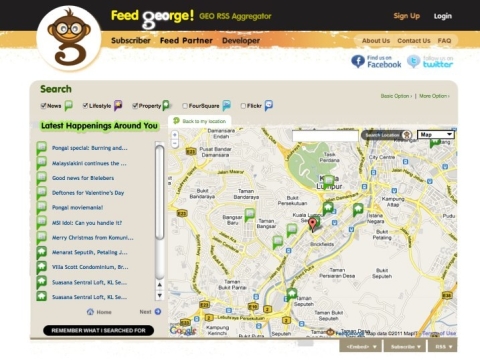
Komunitikini, Malaysian citizen journalism Web portal.

FeedGeorge geo-tagged Web portal.
Lost in San Francisco, no need to ask for directions. Just pull out your mobile phone – iPhone or Android. Pinpoint your current location, “tell” your phone your destination and within a few seconds you have directions.
We have always been surrounded by location-related data, but the rapid growth in geo-location capable mobile devices (phones, tablets, GPS devices) puts a map in our pockets everywhere we go. Asian consumers have come to expect to see information presented to them on a map, especially when they are on the go. On the heels of Twitter, Foursquare has become a quiet force among mobile young people in Hong Kong, Taiwan, Singapore and KL. JiePang.com provides the same type of service for China and Jakartans can stay in touch with who’s where by using Koprol.com, another geo-locating service that Yahoo acquired in early 2010.
To meet these geo-expectations, MalaysiaKini has developed two new services; one, to support geo-mapping of local information and the other to aggregate and distribute geoRSS data (RSS data embedded with geo-tags – latitude and longitude). Both services launched in early January, so I wanted to make an introduction to both.

Komunitikini, Malaysian citizen journalism Web portal.
The second site FeedGeorge aggregates geo-tagged information for display on an easily shared map. Built with a global user base in mind, the site aims to take in geo-located information from anywhere and display the information through a standard Google map. Users who access the site from outside Malaysia will be automatically directed to their location and the related data through IP targeting. Since at launch most of the data in the system is from Malaysia, change your location to Kuala Lumpur to see the current data display. The development team has tried a couple of interesting things to drive usage and encourage more data suppliers to team up with FeedGeorge. One is to create live searches of the FourSquare and Flickr geo-location feeds. The second is to allow users to keep up with news and information changes in a particular area through maps embedded in their own websites, through email updates as well as through RSS readers.
Both sites are in their first month and both teams are working hard to identify and fix bugs and design errors. But two sites bring MalaysiaKini into the rapidly growing world of mapping local news and information for web users at this stage but in the next iteration of the sites on mobile devices. Feel free to play. If you have any questions or comments, send an email to support[at]komunitikini or for FeedGeorge post a comment on the site blog at blog.feedgeorge.com.
Finally, any news organizations that are working with geo-located news or data that would like to distribute their information on FeedGeorge, please send an email to cheeseong[at]feedgeorge.com. Or please leave a comment below and someone will get in touch.